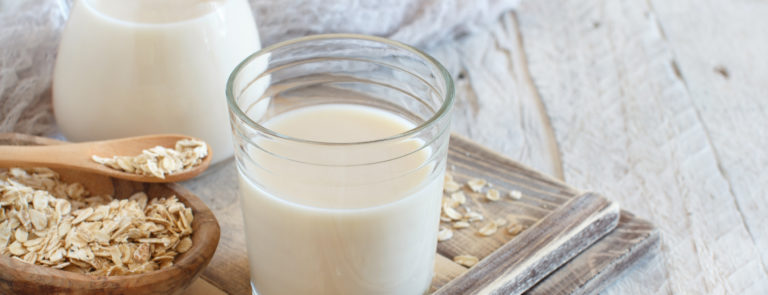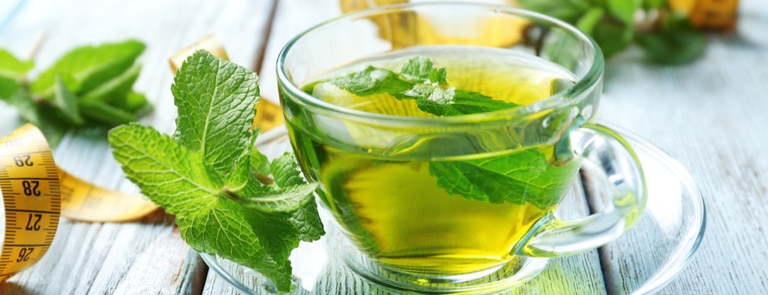10% off £35
12 benefits of oat milk

Oat milk - it’s another one of those non-dairy milk that has appeared on supermarket shelves, adding yet another dimension to the plant-based milk options available to us.
Have you given it a go yet?
If you haven’t because you want to find out more about it, e.g. what it’s made of, what it does and what its nutritional make-up is, then carry on reading.
In this article, we discuss the health benefits of oat milk, its nutritional profile, and who – if anyone – should avoid drinking it.
We also answer some commonly asked questions about oat milk too…
In this article, you’ll find out
- What oat milk is
- What oat milk tastes like
- 12 oat milk benefits
- Oat milk nutrition
- If oat milk is suitable for everyone
- How to make your own oat milk
- FAQs
What is oat milk?
Oat milk is a vegan, soy-free alternative to dairy milk that’s becoming increasingly popular.
Baristas love oat milk as much as vegans because its high carbohydrate content creates a cappuccino as frothy and creamy as one made with cow’s milk.1
Whole oats are renowned for being a nutritionally dense breakfast choice, and the nutritional profile of oat milk is no less potent.
There’s no decrease in vitamin or mineral intake when you swap cow’s milk for oat milk, as most cartons of commercial oat milk are fortified with A, D, B2, and B12 vitamins.2
What does oat milk taste like?
Does it taste like oats? Milk? Or both?
If you’re reading this article and haven’t tried oat milk yet, the general consensus is that it tastes like cow’s milk, but with an oat finish.
It’s also said to be a teeny bit thicker and naturally sweeter than other non-dairy milk too.3
However, the best way to find out what it tastes like is to whip up the DIY recipe below and sample it for yourself…
Summary
Oat milk is a plant-based milk that’s made from oats, so is free from soy, dairy and lactose-free.
A great vegan milk alternative, it tends to be fortified with A, D, B2, and B12 vitamins.
Is oat milk good for you?
Well, it essentially contains oats and water, as well as a few other extras, so surely that’s a good thing?
Generally, oat milk is pretty healthy. But to help you get a better idea of just how good it is for you, find more details on the benefits of oat milk below.
12 benefits of oat milk
If you’re wondering what the health benefits of drinking oat milk are, there happens to be several of them, 10 of which we’ve listed here:
-
Source of vitamin B
B vitamins don’t naturally occur in vegan diets, so this is a huge tick for oat milk.
Oat milk is an excellent source of these essential nutrients due to the fact that most commercial varieties are typically fortified with vitamin B2 and vitamin B12.
You’ll find between 25 and 100% of your daily value of B2 and B12 in an 8oz cup of oat milk.4
Both of these B vitamins help generate energy from the foods we eat. Meanwhile, Vitamin B12 is fundamental for our red blood cells, as well as our brain and nerve cells.5
-
High levels of dietary fibre
Research published in the Journal of Functional Foods in 2020 found that oat milk has more dietary fibre than other plant-based milk, including almond milk, and has therefore been recognised as helping support healthy digestion.6
Fibre plays a key role in blood glucose regulation, binding cholesterol, making sure we have healthy bowel movements and helping us feel fuller for longer.7
-
Oat milk may be good for cholesterol
Consuming oat milk may reduce cholesterol.
This is down to how its beta-glucans bind to the gut and reduce cholesterol absorption.8
Oat milk provides around one-third of your recommended daily beta-glucan intake.
There’s around 25% of your daily recommended calcium intake in a cup of oat milk and around 20% of your recommended Vitamin D intake too, providing your oat milk has been fortified with Vit D.9
According to a study published in Nutrition Reviews, eating 3g of oat beta-glucans daily lowered total and LDL cholesterol levels by between 5 and 7%.10
-
Reduced risk of heart disease
Because oat milk’s beta-glucan content may reduce your cholesterol levels, it can also decrease the risk of developing heart disease.
Initial studies published in the American Society for Clinical Nutrition have linked potential cholesterol-lowering benefits to beta-glucan when consumed as a drink.11
However, it’s still important you continue to eat a healthy, balanced diet as well in order to achieve better heart health.
-
Zero saturated fats
All the saturated fats in cow’s milk are replaced with unsaturated fat in oat milk.12
Oat milk also contains zero fatty acids and trans fats.13
Saturated fat is the type of fat we should ideally eat less of because it has been linked to increased cholesterol levels.14
Saturated fats tend to be solid when at room temperature and are mainly found in animal products.
-
Protein source
Oat milk packs a bit of a protein punch.
For instance, an average cup of oat milk contains around 3g of protein.15
And with 3g of protein per 8oz serving, this means oat milk has higher protein levels than almond milk, cashew milk, coconut milk, and rice milk, which contain minimal amounts of protein in comparison.16,17,18,19
How much protein do you really need?
How much protein do you really need?
From protein powders to bars and high-protein diets, we’re eating more protein than ever. But do we really need to be consuming quite so much?


-
Lactose, nut, dairy and gluten alternative
Oat milk is suitable for most diets – it’s vegan-friendly and lactose, soy and nut-free due to the fact it’s made from oats and water.
Generally speaking, oats are also gluten-free, as well as lactose, dairy and nut-free.
However, it’s still best you carefully scrutinise those labels because it’s possible for oat milk to become cross-contaminated during the manufacturing process.
-
Oat milk benefits for skin
Oat milk happens to be an antioxidant and may potentially help support the skin from daily wear and tear, UV rays, pollution and other free radical damage.20,21
In turn, this can help keep skin looking healthy by reducing the appearance of pigmentation, fine lines and wrinkles.
Meanwhile, it’s also a humectant, which means it helps skin retain water, which is why you’ll often find it’s a common ingredient in moisturisers.22
-
Great for bone health
Because it’s often fortified with calcium and Vitamin D, which are good for maintaining healthy bones.23
While most people associate calcium with a glass of cow’s milk or a block of cheese, many don’t realise that oat milk is actually a good (plant-based) source of calcium.
An 8oz cup of oat milk contains 300 to 400mg of calcium, which is important for strong bone formation and health.24
It also contains potassium and magnesium, which are recognised as being two bone-healthy minerals.
Collectively, calcium and these two minerals help keep our bones strong and healthy.
For example, magnesium helps with calcium absorption while potassium reduces bone breakdown and may help with calcium retention.25,26
-
A happy, healthy gut
Oat milk is also good for the gut – as eating foods that contain beta-glucan has also been linked to gut health.27
A study carried out in 2017 showed that oat milk’s beta-glucan content does have a positive impact on overall gut health.
The study concluded that it improved gut metabolism in 26 healthy people.
They followed a 2-month diet plan that included eating Cuore Mio, pasta enriched with barley beta-glucans (3g/100g).28
-
Healthy hair and nails
As well as potentially repairing and protecting our skin, oat milk can reportedly help make our hair and nails stronger and shinier, as well as encourage them to grow faster.
This is due to the B vitamins, which we’ve mentioned above, that are present in oat milk.29
Vitamin B 12 in particular is often found in hair, skin, and nail supplements.
B vitamins also help fight against oxidative damage to our cells from harmful free radicals, helping to minimise skin damage and encourage cellular repair.
Similarly, B vitamins work anti-ageing magic on hair, too, by encouraging cell renewal in the same way they do for skin.30
They may also play a role in hair colour too - research has suggested that being deficient in B12 can cause premature greying and hair loss.31
-
Feeling fuller for longer
Oat milk has the potential to fill you up for longer in the same way that a bowl of oats does in the morning.
This is due to the fibre content, which may not be a huge amount, but is much more than cow’s milk contains, which is zero.32
Eating a diet that’s rich in fibre promotes satiety and improves appetite control, reducing the need to snack between meals.33
Summary
The health benefits that have been linked to oat milk are widespread.
They range from giving you a healthy skin glow and stronger hair and nails, to boosting Vitamin B, calcium and dietary fibre levels. It can also fill you up for longer too.
Those following low carbohydrate diets should be aware that oat milk has a higher carbohydrate content than other plant-based milk, including soy or almond milk.
Therefore, they may want to avoid oat milk or use it in moderation. Plus, oat milk protein contents aren’t as good as some other types of plant-based milk.
Oat milk calories
Been wondering about oat milk calories? Well, one 240ml cup of unsweetened, fortified oat milk contains around 120 calories.34
And when you compare this to other types of milk (e.g. soy, almond or dairy), oat milk does tend to contain more calories, carbs and fibre.
Summary
Oat milk is dairy-free, contains hardly any saturated fats and more protein than most nut-based milk, as well as fibre, calcium and protein.
But it does contain more carbs than other plant-based milk.
Is oat milk suitable for everyone?
Most people with gluten sensitivity should avoid oat milk – with some exceptions.
Glebe Farm specially developed a gluten-free oat they use for oat milk, so it can be enjoyed by everyone.35
However, the majority of oat milk will most likely cause digestive issues for people with coeliac disease and gluten sensitivity.
If you’re looking to reduce your sugar content, make sure you read the label before you purchase oat milk.
Unsweetened varieties have fewer sugars than cow’s milk.
However, sugars are created when oat starch breaks down into simple sugars in water, increasing the naturally occurring sugar content.36
Soya and almond options may be more appropriate if you are looking to reduce your sugar intake.37
Summary
Oat milk may cause digestive issues for people with coeliac disease or gluten sensitivity.
Always check the label to make sure your oat milk is 100% free of gluten, lactose or nuts, which can creep in during the manufacturing process.
How to make oat milk
Do you quite like the idea of making your own oat milk?
Maybe you’ve never tried it before and fancy making some and sampling it for the first time?
Perhaps you’ve been buying it from the shop for a while now and like the thought of making your own?
Or you might have gluten intolerance and want to make sure your oat milk is entirely gluten-free?
Here’s a recipe to help get you started:
Oat milk recipe
Oat milk is really simple (minimal ingredients), not to mention, relatively quick to make (around 15 minutes).38
Oat milk ingredients
- 1 cup oats (100 g)
- 3 to 4 cups water (750 ml to 1l)
- 1 tsp vanilla extract (optional)
- 1 to 2 tbsp maple syrup or 1 to 2 Medjool dates (optional)
- A pinch of salt (optional)
Method
1
Pour out your oats into a container/bowl and then soak them (you can leave them overnight if you want to).
2
The next day, drain the water from the oats and rinse them through.
3
Get rid of the water they’ve been soaking in.
4
Add the oats, 3 to 4 cups of clean water (750 ml to 1l) and all maple syrup or dates and salt to a blender and blend the mixture until it’s smooth.
Add more or less water depending on how thick you want the consistency of your oat milk to be.
5
Strain the milk using a cheesecloth, strainer, napkin or nut milk bag.
6
Store your oat milk in an airtight container in the fridge.
7
Enjoy it for up to five days!
Some tips for using your DIY oat milk
- Don’t over blend your mixture because this can potentially make your oats turn slimy. Blending them for one minute is usually a sufficient amount of time.
- Don’t heat your milk, it can make it really thick. You can still add it to hot drinks though.
- If you want your oat milk to be gluten-free, then you need to use gluten-free oats to make it.39
Takeaway
There are lots of reasons why oat milk is such a popular plant-based alternative to ‘traditional’ milk, many of which you’re now up to speed on.
On the surface, the plus points of switching to oat milk include the fact it’s naturally dairy and lactose-free, as well as free from gluten (if produced by certified gluten-free manufacturers).
Meanwhile, when you drill down a bit further, you’ll find that oat milk is a health benefit haven, from its vitamin B, calcium, fibre and protein profile, to its links with good gut and bone health and lower cholesterol levels and reduced risk of heart disease, plus many more benefits in addition to the ones listed above!
If you haven’t tried it, make sure you do. And if you have tried it and like it, then now you know all about it, and you now have many reasons to keep enjoying it too!
And now you know how to make your own oat milk, discover some of the other ways you can add more oats into your diet by reading this article, ‘How to eat oats.’
You also asked...
It’s possible for you to be allergic to oat milk if you are allergic to oats.
Meanwhile, you can also be allergic to oat milk if you have coeliac disease or are gluten intolerant because it may have been made with gluten or become cross-contaminated with gluten while being made in the factory.
True gluten-free oat milk comes with a ‘certified gluten-free’ message on the packaging.
The safest way to make sure your oat milk doesn’t contain any gluten is to make your own, which is quick and easy to do because it involves minimal ingredients.
Yes, oat milk is naturally free from dairy, lactose and soy.
It’s also been hailed as a good substitute for animal-derived milk when it comes to baking, with some people claiming it’s the best of all the alternative milk options on the market.
This is due to the fact that oat milk replicates the viscosity of dairy milk more closely than other alternative milk does, making it easy to swap into any cake, muffin, or another recipe, one-for-one.
What’s more, because certain oat milks can taste grainy, it helps them seamlessly blend into baked sweet and savoury goods.
If you’re making oat milk yourself, then you just need oats and water.
If you’re buying your oat milk, then the main two ingredients will be there however, certain brands of oat milk are fortified with vitamins and minerals (e.g. Vitamin D, calcium and potassium) more than others.
No, oat milk isn’t inherently keto.
However, it is possible to drink unsweetened oat milk, but only in moderation though.
Since 1 cup of oat milk contains 8g of carbohydrates, consuming 1/4 cup or 1/2 cup may fit into your macronutrient allowance.
But because there are several other low carb plant-based milk options, such as almond milk, out there, oat milk isn’t classed as being a go-to keto milk.
This is how oat milk stacks up in the keto stakes:
- Unsweetened oat milk contains: 45 calories, 0.5g of fat, 8g of carbohydrates, 1g of fibre and 1g of protein
- Unsweetened almond milk contains: 30 calories, 2.5g of fat, 1g of carbohydrates and 1g of protein
- Unsweetened cashew milk contains: 25 calories, 2g of fat, 1g of carbohydrates and <1g of protein
- Unsweetened coconut milk contains: 45-50 calories, 5g of fat, 1g of carbohydrates and 1g of protein
- Unsweetened macadamia nut milk contains: 50 calories, 4.5g of fat, <1g of carbohydrates and 1g of protein
No, oat milk doesn’t contain any lactose because it is dairy-free.
Lactose is a type of sugar that’s mainly found in animal-derived milk and other dairy products.
Oat milk happens to be naturally free from lactose, making it a vegan-friendly alternative to cow’s milk.
Yes, oat milk is vegan because it’s not made from animal sources or animal-derived ingredients.
What’s more, oat milk is widely considered to be the most sustainable and environmentally-friendly of all the mainstream plant-based milk, both in comparison to cow’s milk and other alt-milks.
There are reports that swapping cow’s milk for oat milk can cut CO2 levels by as much as 73%.
Meanwhile, while it takes 4 to 5 litres of water to grow a single almond and the soybean industry is being linked to deforestation, oats are regarded as a valuable part of crop rotation systems.
What’s more, they can be grown locally relatively easily across many regions worldwide.
Last updated: 29 December 2021
- https://medium.com/tenderlymag/testing-nine-barista-style-vegan-milks-with-a-pro-4cb7e5d79651
- https://fdc.nal.usda.gov/fdc-app.html#/food-details/719016/nutrients
- http://www.eatingwell.com/featured/StriveEverythingAboutOatMilk
- https://fdc.nal.usda.gov/fdc-app.html#/food-details/719016/nutrients
- https://www.nhs.uk/conditions/vitamins-and-minerals/vitamin-b/
- https://www.sciencedirect.com/science/article/pii/S1756464620301997
- https://www.helpguide.org/articles/healthy-eating/high-fiber-foods.htm
- https://pubmed.ncbi.nlm.nih.gov/10749030/
- https://fdc.nal.usda.gov/fdc-app.html#/food-details/719016/nutrients
- https://pubmed.ncbi.nlm.nih.gov/21631511/
- https://pubmed.ncbi.nlm.nih.gov/16522906/
- https://pubmed.ncbi.nlm.nih.gov/9745107
- https://fdc.nal.usda.gov/fdc-app.html#/food-details/719016/nutrients
- https://www.nhs.uk/live-well/eat-well/different-fats-nutrition/
- https://fdc.nal.usda.gov/fdc-app.html#/food-details/719016/nutrients
- https://fdc.nal.usda.gov/fdc-app.html#/food-details/2137169/nutrients
- https://fdc.nal.usda.gov/fdc-app.html#/food-details/2014635/nutrients
- https://fdc.nal.usda.gov/fdc-app.html#/food-details/2149146/nutrients
- https://fdc.nal.usda.gov/fdc-app.html#/food-details/171942/nutrients
- https://pubmed.ncbi.nlm.nih.gov/9745107/
- https://pubmed.ncbi.nlm.nih.gov/24964816/
- https://www.instyle.com/beauty/beauty-products-tools/oat-milk-beauty-products
- https://ods.od.nih.gov/factsheets/Calcium-HealthProfessional/
- https://fdc.nal.usda.gov/fdc-app.html#/food-details/719016/nutrients
- https://www.sciencedirect.com/science/article/abs/pii/S0271531799000408
- https://pubmed.ncbi.nlm.nih.gov/28093633/
- https://www.goodhousekeeping.com/health/diet-nutrition/a27079365/oat-milk-nutrition/
- https://www.ncbi.nlm.nih.gov/pmc/articles/PMC5249102/#__ffn_sectitle
- https://fdc.nal.usda.gov/fdc-app.html#/food-details/719016/nutrients
- https://www.ncbi.nlm.nih.gov/pubmed/19727438
- https://www.ncbi.nlm.nih.gov/pmc/articles/PMC5514791/
- https://www.thelist.com/18546/happens-stop-eating-dairy/
- https://www.livestrong.com/article/267017-what-are-the-benefits-of-oat-milk/
- https://minorfigures.com/products/organic-oat-milk
- /shop/product/glebe-farm-barista-style-oat-milk-60034760
- https://www.foodnavigator-usa.com/Article/2019/06/29/Oatly-challenged-over-no-added-sugars-claims-on-unsweetened-oatmilk
- https://www.veganfoodandliving.com/features/the-white-stuff-which-plant-milk-is-the-most-nutritious/
- https://simpleveganblog.com/how-to-make-oat-milk/
- https://lovingitvegan.com/oat-milk/














